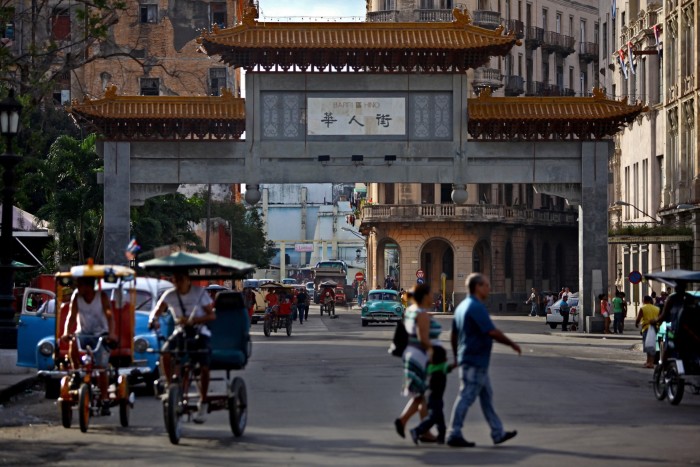Cuba today does not even feature among China’s top-tier allies in Latin America. Beijing has what it calls “comprehensive strategic partnerships” with Argentina, Brazil, Chile, Ecuador, Mexico, Peru and Venezuela, all major commodity exporters, but not with Cuba.
China publicly supports Cuba’s right to choose its own path to economic development “in line with its national conditions”, but privately Chinese officials have long urged the Cuban leadership to shift from its vertically planned economy to something closer to the Chinese model, according to economists and diplomats briefed on the situation.
Chinese officials have been perplexed and frustrated at the Cuban leadership’s unwillingness to decisively implement a market-oriented reform programme despite the glaring dysfunction of the status quo, the people said.
 Havana’s Chinatown © David Silverman/Getty Images
Havana’s Chinatown © David Silverman/Getty Images
The fraying of trade ties forms a stark contrast with recent decades. After more than 10 years of extreme scarcity after the Soviet Union collapsed, an influx of imports in the early 2000s made such an impact that Chinese brands became part of the Cuban vernacular.
“Taking the Yutong” is now synonymous with “taking the bus” in Havana, while Cubans — experts in gallows humour — baptised the hundreds of thousands of leaky Haier refrigerators imported as part of Fidel Castro’s “Energy Revolution” to improve energy efficiency as “Drippys”.
Cuba has been a member of China’s Belt and Road global infrastructure development initiative since 2018 and China remains the island nation’s second trading partner after Venezuela, which sends the country oil in return for Cuban doctors.
Beijing and Havana have a cyber security agreement, and over the past two decades Chinese groups Huawei, TP-Link and ZTE have installed fibre optic cables, WiFi hotspots and other digital infrastructure throughout the island.
But Chinese imports are “way down . . . overall”, said one western businessman based in Havana. “Exporters are shifting away from the China-Cuba credit lines and moving to the private sector.”
Cuba still exports nickel, zinc and luxury cigars to China, leases doctors in return for hard currency payment, and co-operates on biotech.
Cuban President Miguel Diáz-Canel has twice visited Beijing and brought back politically useful handouts, including medical equipment during the pandemic, a $100 million donation last year and thousands of tonnes of rice donations this year. But he has been unable to coax greater economic integration.
“The Chinese don’t give away a lot of charity,” said William LeoGrande, professor of government at American University. “The Cubans right now are in a position where they need charity, and they don’t have much to offer in return.”
Beijing also has a much lower-profile security relationship with Havana than does Moscow, which is openly focused on Cuba’s geopolitical value as a close neighbour of the US. Russian naval flotillas have docked in Havana twice this year in a show of military strength. Russian trade with Cuba has surged in recent years, driven by US sanctions on both countries and the war in Ukraine.
There have been reports suggesting China has renewed efforts to take advantage of Cuba’s strategic location with electronic eavesdropping stations on the island.
Recommended

The Center for Strategic and International Studies, a Washington think- tank, said in July there were “growing signs that China’s economic and political leverage may be opening doors for its military and intelligence services in Cuba”. US secretary of state Antony Blinken said last year that Chinese spying operations in Cuba were “a serious concern”.
But asked about the CSIS report, a US state department official said the Biden administration believed its “diplomatic outreach has slowed down [China’s] efforts to project and sustain its military power around the world”.
LeoGrande said some in Florida and Washington were keen to create a “Chinese bogeyman in Cuba”. “It serves the interests of conservative Cuban-Americans, who are always looking for reasons not to improve US-Cuban relations, and in the broader policy community it serves the interest of those who think that China is a global threat.”
Source link : http://www.bing.com/news/apiclick.aspx?ref=FexRss&aid=&tid=670c4bb6b55f4796a1da1b5387006f00&url=https%3A%2F%2Fwww.ft.com%2Fcontent%2F9ca0a495-d5d9-4cc5-acf5-43f42a9128b4&c=6842601011288526251&mkt=en-us
Author :
Publish date : 2024-10-13 10:14:00
Copyright for syndicated content belongs to the linked Source.











